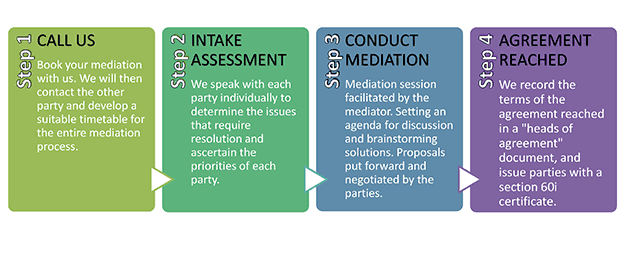family Dispute Resolution Near Me

What is the process for mediation?
Family Dispute Resolution (‘FDR’) is a mediation process whereby parties involved in a family law dispute attempt to resolve that dispute outside of court with the assistance of a mediator. Mediation provides a much cheaper and quicker mechanism for resolving the family law dispute, compared with litigation.
To get started, simply call our office and tell us that you would like to arrange a mediation. We will then collect the information necessary to complete the entire mediation process. We will need to know the names and contact details of the parties who will be involved in the mediation, and we will need to know the subject of the dispute that requires mediating (eg. is it a child custody dispute, an asset/ property division, or both?). We will then make arrangements to conduct the mediation on a date that is most convenient for all parties involved. The parties may elect to participate in mediation via remote means (typically via Zoom or Microsoft Teams) or in person at any of our offices in Western Sydney (at no extra cost).
Preparing for your mediation
Mediating a family law property dispute
The first thing to do as part of a family law mediation involving the division of assets is to prepare a document known as a "balance sheet". We will provide you with a template to get you started, and we can provide advice on how to develop the balance sheet. The aim of this process is to calculate the value of net assets available for distribution between the parties. This may involve estimating values for real estate (or obtaining valuations), contacting your superannuation fund and bank to ascertain the current balance of accounts in your name (including debts such as mortgage and credit card accounts).
Do I need to get the house valued?
Not necessarily. Sometime parties will agree on the estimated value of assets for the purpose of mediation. In that case, there is no need to spend additional money on professional valuations. Parties often obtain free appraisals from real estate agents in order to help guide the process of estimating the market value of real property. Where there is a significant dispute about the value of an asset, it may be appropriate to pay for a joint valuation by a qualified valuer. We can provide help and guidance to the parties throughout this process.

How do I prepare for a parenting mediation
Mediations about where the children live and when they should spend time with the other parent can be emotionally charged. In order to assist parties in grappling with parenting issues, and to put the best interests of the children ahead of their own personal interests, expert reports are sometimes beneficial. If your matter is already in court, it is very likely that the court will have ordered the preparation of such a report. If your matter is not in court, we can assist you in determining whether a child expert report may be beneficial in your case.
If we reach agreement at mediation, is it legally enforceable?
At the end of the mediation we will provide you with a document titled "heads of agreement". This document summarises the nature of the agreement reached in broad terms, but it does not have any formal legal effect until the terms of the agreement are solemnised into consent orders or a binding financial agreement. Once the orders have been approved by the court (or at the time that the binding financial agreement has been properly executed by all parties) then the outcome of the mediation will have enforceable legal effect.
How long does Family Dispute Resolution take?
In some cases, especially those involving simple disputes and cooperative parties, agreement can be achieved in around 4 hours or so. The majority of family law mediations require a full day, however. In cases involving intractable disputes, unreasonable or inflexible participants, or those involving complex issues, sometimes multiple mediation session will be required. This can potentially involve mediating over more than a single day. These types of cases are fairly uncommon, and most people will not need more than a single session. Ultimately this comes down to the parties themselves, and how reasonable they are prepared to be.

How much does mediation cost?
Dean Bainbridge charges a fixed fee of $935 per party for up to a full day of mediation. This fixed fee is GST inclusive and includes all preparation and administrative work (including the issuing of a section 60i certificate). There are no hidden or additional charges for the mediation. The cost also includes free catering for in-person mediations conducted at our office.
SECTION 60I CERTIFICATES
What is a s60I certificate?
Section 60I of the Family Law Act 1975 seeks to ensure that all persons who have a dispute about parenting matters make a genuine effort to resolve that dispute by family dispute resolution before going to court. A section 60I certificate typically states that a person has attended upon an FDR practitioner for the purpose of trying to resolve the family law parenting dispute through mediation, or that family dispute resolution is not appropriate. The certificate allows that person to then file an application for parenting orders in either the Family Court of Australia or the Federal Circuit Court.
What does a section 60i certificate say?
A s60I certificate relates to the result of the FDR and can only be issued by an accredited FDR practitioner. The certificate will state one of the following:
The court may take into account the type of certificate that has been issued when making an order and when deciding on possible costs awards.

Are there any exceptions to obtaining a s60I certificate?
There are a number of exceptions to the general requirement to obtain a s60I certificate prior to filing for parenting orders. These include where:
- a) The application is for orders that are to be made with the consent of all the parties or in response to an application made from another party;
- b) There has been family violence or child abuse or there is a risk of family violence or child abuse;
- c) An existing order relating matters involving children has been contravened;
- d) The case is one of urgency; or
- e) One of the parties is unable to participate effectively in FDR because they are incapacitated in some way.
Are the things said in FDR confidential?
Under s10H of the Family Law Act, an FDR practitioner is required to keep everything said in FDR confidential. A FDR practitioner is not to disclose communications in a mediation unless the party who made that communication gives their consent or if the FDR practitioner reasonably believes another person or a child has been, or is at risk of, being harmed.
Is anything said in FDR admissible in court?
Everything said during the mediation is confidential. It is also legally inadmissible as evidence in court under s10J of the Family Law Act. The only exceptions are where there has been an admission by a party that a child has been abused or is at risk of being abused or where there is a disclosure by a child that they have been abused or are at risk of being abused.
Family Dispute Resolution and financial matters
The Family Law Rules require all parties involved in a financial dispute to make a genuine effort to resolve that dispute prior to going to court. The court expects that all parties have attempted pre-action procedures prior to filing an initiating application. FDR is one included as one of these pre-action procedures. A party who has not complied with these procedures may have costs penalties awarded against them.
There are certain circumstances in which parties are exempt from following pre-action procedures. These include cases involving urgency, family violence and child abuse, fraud, intractable issues, or where a time limit is close to expiring. To make further enquiries about mediation near me, please call us today.
How can Bainbridge Legal help?
Our principal Solicitor, Dean Bainbridge, is an Accredited Family Dispute Resolution Practitioner, and he is also an Accredited Family Law Specialist. With more than 20 years experience and participating in hundreds of mediations, Dean highly regarded in the field of family law. Call us today on 1300 148 110 to book Dean Bainbridge as mediator for your family law dispute.